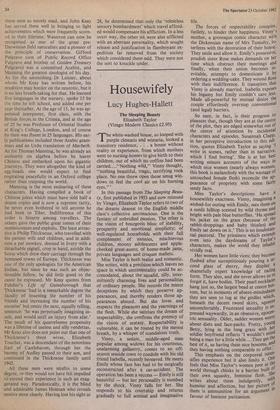Housewifely
Lucy Hughes-Hallett
`rr he white-washed house, so looped with 1 purple clematis and wistaria, looked a transitory residence, . . . a house without reality or experience, from which mothers went to nursing-homes to give birth to their children, out of which no coffins had been carried...."Nothing wild," Vinny thought, "nothing beautiful, tragic, terrifying took place. No one threw open those smug win- dows to feel the cool air on his burning eyes."'
In this passage from The Sleeping Beau- ty, first published in 1953 and now reissued by Virago, Elizabeth Taylor refers to two of the dreams dearest to the English middle class's collective unconscious. One is the fantasy of unbridled passion. The other is the vision of bourgeois bliss: of stability, prosperity and emotional simplicity; of well-regulated households with their full complement of nannies, mischievous children, moony adolescents and apple- cheeked great-aunts; of home-made jams, private languages and croquet mallets.
Miss Taylor is both realist and romantic. She writes, with a precision which leaves no space in which sentimentality could be ac- comodated, about the squalid, silly, inter- mittently charming lives and personalities of ordinary people. She records the minor deceptions by which they preserve ap- pearances, and thereby renders those ap- pearances absurd. But she loves and respects the pleasures and the yearnings of the flesh. While she satirises the dream of respectability, she confirms the potency of the vision of ecstasy. Respectability is vulnerable, it can be routed by the merest breath, by a whisper of scandalous truth.
Vinny, a sedate, middle-aged man popular among widows for his courteous, unalarming gallantry, comes to an off- season seaside town to condole with his old friend Isabella, recently bereaved. He meets Emily whose face has had to be surgically reconstructed after a car-accident. The operation has been a success — Emily is still beautiful — but her personality is numbed by the shock. Vinny falls for her. She responds to his courtship and returns gradually to full sensual and imaginative life.
The forces of respectability conspire, futilely, to hinder their happiness. VinnY's
mother, a grotesque comic character with the Dickensian name of Mrs Tumulty, in- terferes with the decoration of their house. They smile and allow it. Emily's possessive, prudish sister Rose makes demands on her time which obstruct their meetings and finally, when their union becomes in- evitable, attempts to domesticate it by ordering a wedding-cake. They wound Rose with their indifference. It transpires that Vinny is already married. Isabella exposes his bigamy but Emily couldn't care less. Made all-powerful by mutual desire the couple effortlessly overstep conventional (and legal) barriers.
So easy, in fact, is their progress to pleasure that, though they are at the centre of the plot, they are edged somewhat out of the centre of attention by incidental characters and episodes. Susannah ClapP, in her perceptive introduction to this edi- tion, quotes Elizabeth Taylor as saying write in scenes, rather than in narrative, which I find boring'. She is at her best writing minute accounts of the ways in which nice women (nearly always women, this book is melancholy with the wastage of untouched female flesh) reconcile the ap- pearance of propriety with some fairly seedy facts.
Miss Taylor's descriptions have a housewifely exactness. Vinny, imagining a wished-for outing with Emily, sees them on a sunlit hilltop scented by wild thyme and bright with pale blue butterflies. 'He spread his jacket on the grass (because of the rabbit-droppings and baby thistles) an Emily sat down on it.' This is no insubstan- tial pastoral. The prissiness which extends even into the daydreams of Taylors characters, makes the world they inhabit vividly real.
Her women have little vices; they become flushed after surreptitiously pouring a se- cond glass of sherry, they display, a shamefully expert knowledge of racing form. They also, and she never allows us to forget it, have bodies. Their pearl necklaces hang just so, the largest bead at centre bot- tom, but in moments of absent-mindedness they are seen to tug at the girdles which, beneath the decent tweed skirts, squeeze uncomfortably. Frustrated sexuality is ex- pressed waywardly, in an obsessive, egocen- tric sensuality. Older, sadder women woo' about diets and face-packs. Pretty, Young, Betty, lying in the long grass with her soldier boyfriend reflects 'I wouldn't mind being a man for a little while....They get the best of it, us having these nice bosoms, an they having nothing comparable to offer. This emphasis on the corporeal inten- sifies experience but it also limits it. One feels that Miss Taylor's women peer at the, world through chinks in a barrier built °I their own squashy, feminine flesh. She writes about them indulgently, with humour and affection, but her picture of them is ammunition for an argument In favour of feminist puritanism.










































 Previous page
Previous page